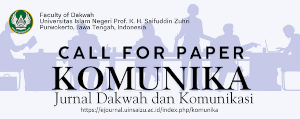COGNITIVE SCIENCE DAN COGNITIVE DEVELOPMENT DALAM PEMROSESAN INFORMASI (INFORMATION PROCESSING) PADAANAK
DOI:
https://doi.org/10.24090/komunika.v10i2.945Keywords:
cognitive science, cognitive development, information processing, child.Abstract
Cognitive science is a science which studies how human mental processes to influence one’s behavior. Principal major issue that needs to be known in the understanding of cognitive science and their development is related to how the initial state of cognitive science itself, the mind is adapted, the development process starting from the concrete to the abstract, the conceptual nature of the change, the difference between learning and development, format representation of the underlying changes in development, the role of implicit and explicit cognitions in the development, the role of the association and the rules in the development, the universal development, cognitive domain and how to influence the development of brain structure. There are three difference in the cognitive domain of the most common sense that domain as a module, as the domain of expertise, and domain as a model of mind. Ilmu kognitif adalah suatu pengetahuan yang mempelajari tentang bagaimana proses mental manusia dalam mempengaruhi perilaku seseorang. Pokok pembahasan utama yang perlu diketahui dalam memahami ilmu kognitif dan perkembangannya yaitu terkait dengan bagaimana keadaan awal dari ilmu kognitif itu sendiri, pikiran yang teradaptasi, proses perkembangan mulai dari hal yang kongkrit sampai dengan abstrak, sifat konseptual dalam perubahan, perbedaan antara belajar dan pengembangan, format representasi yang mendasari perubahan dalam perkembangan, peran kognisi implisit dan eksplisit dalam perkembangan, peran asosiasi dan aturan dalam perkembangan, perkembangan secara universal, domain kognitif dan bagaimana struktur otak mempengaruhi perkembangan. Ada tiga perbedaan domain kognitif dari indera yang paling umum yaitu domain sebagai modul, domain sebagai bidang keahlian, dan domain sebagai model pikiran.Downloads
Download data is not yet available.
References
Atkinson, R.C. & Shiffrin, R. M. (1968). Human Memory: A Proposed System and Its Control Processes. New York: Academic Press.
Ellias, L.J. & Saucier, S.M. (2006). Neuropsychology Clinical and Experimental Foundations. Boston: Pearson Education, Inc.
Frishammar, J. (2002). “Characteristics in Information Processing Approachesâ€. International Journal of Information Management, 22, 143- 156.
Kuhn, D. & Siegler, R. (2006). Handbook of Child Psychology 6th Edition, Volume Two: Cognition, Perception, and Language. New Jersey: John Wiley & Sons, Inc.
Lavine, H., Borgida, E. & Sullivan, J.L. (2000). “On The Relationship Between Attitude Involvement and Attitude Accessibility: Toward A Cognitive-Motivational Model of Political Information Processingâ€. Political Psychology, 21(1), 81-106.
Phillips, J.M. (2008). “The Role of Excess Cognitive Capacity in the Relationship Between Job Characteristics and Cognitive Task Engagementâ€. Journal of Business and Psychology, 23(1), 11-24.
Rammsayer, T. & Altenmüller, E. (2006). “Temporal Information Processing in Musicians and Nonmusiciansâ€. Music Perception: An Interdisciplinary Journal, 24 (1), 37-48.
Ramsey-Rennels, J. L. & Langlois, J. H. (2006). “Infants’ Differential Processing of Female and Male Facesâ€. Current Directions in Psychological Science, 15 (2), 59-62.
Rudolph, T. J. & Popp, E. (2007). An Information Processing Theory of Ambivalence. Political Psychology, 28 (5), 563-585.
Slavin, R.E. (1994). Cooperative Learning: Theory, Research and Practice. New Jersey: Prentice Hall.
Sweller, J. & Sweller, S. (2006). “Natural Information Processing Systemsâ€. Evolutionary Psychology, 4, 434-458.
Yeigh, T. (2007). “Information-Processing and Perceptions of Control: How Attribution Style Affects Task-Relevant Processingâ€. Australian Journal of Educational and Developmental Psychology, 7, 120-138.
Ellias, L.J. & Saucier, S.M. (2006). Neuropsychology Clinical and Experimental Foundations. Boston: Pearson Education, Inc.
Frishammar, J. (2002). “Characteristics in Information Processing Approachesâ€. International Journal of Information Management, 22, 143- 156.
Kuhn, D. & Siegler, R. (2006). Handbook of Child Psychology 6th Edition, Volume Two: Cognition, Perception, and Language. New Jersey: John Wiley & Sons, Inc.
Lavine, H., Borgida, E. & Sullivan, J.L. (2000). “On The Relationship Between Attitude Involvement and Attitude Accessibility: Toward A Cognitive-Motivational Model of Political Information Processingâ€. Political Psychology, 21(1), 81-106.
Phillips, J.M. (2008). “The Role of Excess Cognitive Capacity in the Relationship Between Job Characteristics and Cognitive Task Engagementâ€. Journal of Business and Psychology, 23(1), 11-24.
Rammsayer, T. & Altenmüller, E. (2006). “Temporal Information Processing in Musicians and Nonmusiciansâ€. Music Perception: An Interdisciplinary Journal, 24 (1), 37-48.
Ramsey-Rennels, J. L. & Langlois, J. H. (2006). “Infants’ Differential Processing of Female and Male Facesâ€. Current Directions in Psychological Science, 15 (2), 59-62.
Rudolph, T. J. & Popp, E. (2007). An Information Processing Theory of Ambivalence. Political Psychology, 28 (5), 563-585.
Slavin, R.E. (1994). Cooperative Learning: Theory, Research and Practice. New Jersey: Prentice Hall.
Sweller, J. & Sweller, S. (2006). “Natural Information Processing Systemsâ€. Evolutionary Psychology, 4, 434-458.
Yeigh, T. (2007). “Information-Processing and Perceptions of Control: How Attribution Style Affects Task-Relevant Processingâ€. Australian Journal of Educational and Developmental Psychology, 7, 120-138.
Downloads
Published
2017-03-01
Issue
Section
Articles
License
Authors who publish with this journal agree to the following terms:
- Authors retain copyright and grant the journal right of first publication with the work simultaneously licensed under a Creative Commons Attribution-ShareAlike 4.0 International License that allows others to share the work with an acknowledgement of the work's authorship and initial publication in this journal.
- Authors are able to enter into separate, additional contractual arrangements for the non-exclusive distribution of the journal's published version of the work (e.g., post it to an institutional repository or publish it in a book), with an acknowledgement of its initial publication in this journal.
- Authors are permitted and encouraged to post their work online (e.g., in institutional repositories or on their website) prior to and during the submission process, as it can lead to productive exchanges, as well as earlier and greater citation of published work (See The Effect of Open Access).





























